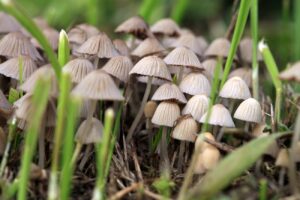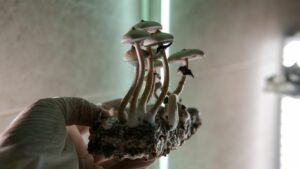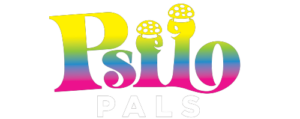A Journey into the Kaleidoscope of Consciousness: Psilocybin Therapy – Redefining Mental Wellness
- February 28, 2024
- 4:23 am

Notable Elements
Psilocybin Therapy Overview: Explore the transformative potential of psilocybin therapy, a psychedelic-assisted psychotherapy addressing mental health using compounds found in magic mushrooms.
History and Discovery: Delve into the historical roots of psilocybin use, from ancient rituals to its scientific discovery by Swiss chemist Albert Hofmann in 1959, sparking research in the mid-20th century.
Legal Landscape: Understand the legal status of psilocybin therapy globally, highlighting recent changes in certain jurisdictions like Canada, Brazil, Oregon, and Colorado, while emphasizing the need to stay informed about evolving regulations.
Benefits and Applications: Discover the potential benefits of psilocybin therapy, including relief from treatment-resistant depression, anxiety reduction (including end-of-life anxiety), addiction treatment, PTSD intervention, and potential benefits for individuals with OCD.
Session Phases: Gain insights into the structured phases of psilocybin therapy sessions, covering preparation and screening, the psilocybin experience itself, and post-session integration, crucial for embedding insights into daily life.
Risks and Drawbacks: Acknowledge the potential risks and drawbacks of psilocybin therapy, including psychological distress, unintended emotional processing, unknown long-term effects, no guaranteed cure, legal restrictions, potential for misuse, restricted suitability, and cost considerations.
FAQs on Psilocybin Therapy: Address common questions surrounding the effectiveness of psilocybin therapy, its impact on the brain, its potential for PTSD treatment, eligibility criteria, recommended dosage, and information on costs (where applicable).
Final Thoughts: Emphasize that while psilocybin therapy holds promise, it is an emerging field requiring careful consideration and professional guidance. Encourage ongoing research as it shapes the future of mental healthcare.
Introduction
What if you could experience healing and a deeper connection to yourself and the world around you? I invite you to join me to explore the transformative power of psilocybin therapy.
When we talk about Psilocybin therapy, many people think it to be “magic mushrooms” for some recreational usage. Psilocybin therapy is a method for addressing mental health issues in the world of psychedelic therapy.
So, what is Psychedelic therapy? Psychedelic therapy, often termed as Psychedelic-Assisted Psychotherapy (PAP) is a broad term where psychedelic plant compounds induce hallucinations, like LSD, MDMA, magic mushrooms, DMT, peyote, ayahuasca, ibogaine, etc., to treat mental health issues. Psilocybin therapy is a part of it. Doctors prescribe this treatment or combine it with various therapies.

What is Psilocybin Therapy?
Psilocybin-assisted therapy involves a Psilocybin compound derived from Psilocybe mushrooms or shrooms ( hallucinogenic substance), as per the Drug Enforcement Administration DEA.
It is a therapeutic approach that utilizes psilocybin, a naturally occurring psychedelic compound, to facilitate profound personal growth and transformation. It involves working with skilled therapists in a safe and controlled environment to guide individuals through a profound journey into their inner landscapes. People receiving this therapy are monitored by trained doctors following each dose.
Through a combination of psychedelic medication and deep introspection, psilocybin therapy aims to unlock the potential for lasting change, addressing various emotional and mental struggles.
What is the History of Psilocybin Mushroom Therapy?
The first known evidence of psilocybin use dates back to Mesoamerica, where psilocybin mushrooms were used in religious and spiritual rituals for millennia.
However, the scientific journey of psilocybin therapy began in 1959 when Albert Hofmann, a Swiss chemist, isolated psilocybin from the Psilocybe mexicana mushroom. This discovery ignited a wave of research in the 1950s and 1960s. Psychiatrists like Humphry Osmond, Abram Hoffer, and Rick Strassman explored potential as a healing tool for various conditions, including depression, anxiety, and addiction.
By the late 1960s, societal and political anxieties surrounding recreational drug use, coupled with concerns about potential misuse, led to stricter regulations and a decline in research funding. Psilocybin is classified as a Schedule I drug in the US, severely restricting its research and clinical application.
Is Psilocybin Therapy Legal?
Psilocybin therapy remains illegal at the federal level in most countries, including the United States. Schedule I drugs have a high abuse potential and are currently not accepted for medical use. This classification significantly restricts research and therapeutic application.
However, the legal landscape is evolving. Countries, including Canada and Brazil, have granted special exemptions for psilocybin-assisted therapy in specific contexts. Additionally, some US states like Oregon and Colorado have decriminalized possession of psilocybin and legalized its therapeutic use under controlled settings with licensed facilitators.
It is important to note that even in these jurisdictions, regulations are still being developed and implemented. It is crucial to stay updated on the evolving legal situation.
ALSO READ – Are Magic Mushrooms Addictive?
What are the benefits of Psilocybin Assisted Therapy?
Psilocybin therapy, while still under investigation, presents several potential benefits for treating various mental health conditions. Here are some promising aspects:
1. Relief from treatment-resistant depression: Studies suggest psilocybin therapy may offer relief for individuals struggling with depression, especially those who haven’t responded well to traditional treatments. Research indicates it may help individuals gain new perspectives, break negative thought patterns, and experience a sense of emotional well-being.
2. Reduction of anxiety, including end-of-life anxiety: Psilocybin therapy shows promise in alleviating anxiety, particularly in individuals with terminal illnesses facing existential concerns. Studies suggest it can help individuals process their emotions, reduce fear and anxiety, and improve their quality of life.
3. Potential for treating addiction: Early research suggests psilocybin therapy may hold potential for treating various addictions, including smoking, alcohol, and cocaine dependence. It may help individuals confront the underlying causes of addiction, reduce cravings, and increase motivation for recovery.
4. Addressing post-traumatic stress disorder (PTSD): Psilocybin therapy is being explored as a potential treatment option for PTSD. Studies indicate it may help individuals process traumatic memories, reduce emotional distress, and improve their overall well-being.
5. Potential for treating obsessive-compulsive disorder (OCD): Early research suggests psilocybin therapy may offer benefits for individuals with OCD. It may help them break free from repetitive thoughts and behaviors for improved quality of life.

What to expect from Psilocybin Therapy Sessions?
Psilocybin therapy sessions involve a structured process with distinct phases. Here is what to expect:
1. Preparation and Screening (Pre-session):
It involves a thorough assessment with a qualified healthcare professional experienced in psilocybin therapy. They will discuss your mental health history, current symptoms, and suitability for the therapy, ensuring it aligns with your individual needs and safety. You receive detailed information about psilocybin therapy, including its potential benefits, risks, and side effects. You can ask questions and make an informed decision about proceeding.
These sessions, typically held weeks before the actual psilocybin experience, aim to prepare you mentally and emotionally. They may involve setting intentions, exploring potential challenges, and practicing relaxation techniques to enhance your experience.
2. The Psilocybin Experience (Session):
The session happens in a safe and controlled setting, often a dedicated facility with comfortable surroundings. Supportive and experienced professionals will be present throughout the session to guide and assist you. You will receive a predetermined dose of psilocybin, typically in capsule form.
The effects of psilocybin typically begin within 30-60 minutes and can last several hours. You might experience varied effects, including altered perceptions, emotional shifts, and confusing senses. The therapist will be present throughout the session, providing support and guidance while allowing you to explore your inner landscape. They may utilize techniques like music or guided imagery to enhance the experience.
3. Integration (Post-session):
Following the psilocybin experience, you attend integration sessions with your therapist to process the insights and experiences gained. This crucial phase helps you integrate these learnings into your daily life and navigate challenges. Depending on your needs and progress, you may continue therapy sessions with your healthcare professional to maintain positive changes and address ongoing challenges.
Risk and Side-effects of Psilocybin Therapy
Psilocybin therapy, despite its potential benefits, is not without risks and drawbacks. Below are the concerns:
1. Psychological distress: The experience induced by psilocybin can be intense and unpredictable. Individuals may experience negative psychological effects like anxiety, fear, paranoia, and even temporary psychosis. These experiences can be highly distressing and require experienced professionals to guide and support individuals through them.
2. Unintended emotional processing: While psilocybin can help process difficult emotions, it can also lead to the unintended surfacing of suppressed traumatic memories or unresolved emotional conflicts. This can be overwhelming and require additional therapeutic support to navigate effectively.
3. Long-term effects unknown: As psilocybin therapy is still under investigation, the long-term effects on the brain and overall health are still unknown. Consistent research is ongoing to understand any potential long-term consequences.
4. Not a guaranteed cure: It’s crucial to understand that psilocybin therapy is not a magic bullet. While it shows promise for various conditions, not a guaranteed cure and is part of a comprehensive treatment plan incorporating other therapeutic modalities.
5. Legal restrictions: Psilocybin remains classified as a Schedule I drug in most countries, including the United States, meaning it has a high potential for abuse and no currently accepted medical use. It significantly restricts access to legal and safe psilocybin therapy in many regions.
6. Potential for misuse: Due to its psychoactive nature, psilocybin carries the risk of misuse outside of controlled therapeutic settings. It can lead to unpredictable and potentially harmful outcomes.
7. Not suitable for everyone: Individuals with certain mental health conditions, such as schizophrenia or a family history of psychosis, may be at increased risk of experiencing side effects from psilocybin therapy. It’s crucial to undergo a thorough screening process to determine suitability.
8. Cost and availability: Access to psilocybin therapy is limited due to legal restrictions and ongoing research. Additionally, the cost can be significant, further hindering accessibility.
Psilocybin Therapy FAQs:
Q: Is psilocybin therapy helpful?
A: While research is ongoing, psilocybin therapy shows promising results in treating various mental health conditions, particularly those resistant to traditional treatments. It is not a guaranteed cure but a broad treatment.
Q: What does psilocybin do to the brain?
A: The exact mechanism of action is still being explored, but psilocybin temporarily alters brain function by interacting with the serotonin system. It can lead to altered perception, thought patterns, and emotional processing.
Q: Does psilocybin therapy help with PTSD?
A: Early research suggests psilocybin therapy may be beneficial for individuals with PTSD. Studies indicate it may help them process traumatic memories, reduce emotional distress, and improve their overall well-being. However, more research is required.
Q: Who cannot take psilocybin therapy?
A: Psilocybin therapy may not be suitable for everyone. Individuals with certain mental health conditions, such as schizophrenia or a family history of psychosis, pregnant or breastfeeding women, and those with a history of substance abuse, are generally advised against undergoing psilocybin therapy.
Q: What is the dosage of psilocybin for this therapy?
A: A qualified healthcare professional determines the dosage of psilocybin therapy on the patient’s specific needs, overall health, and medical history. Self-administering psilocybin outside of a controlled therapeutic setting is highly discouraged due to potential risks and unpredictable outcomes.
Q: How much does psilocybin therapy cost in Canada?
A: As psilocybin therapy remains illegal at the federal level in Canada, it’s currently not offered as a standard medical treatment with established costs. However, some provinces are exploring legal frameworks for therapeutic psilocybin use under specific regulations. In these settings, the cost might depend on various factors like the number of sessions, location, and the healthcare provider.
Final Words
Psilocybin therapy offers a bright but emergent approach to mental health. While not a cure-all, it shows potential for various conditions. However, careful consideration and professional guidance are crucial before starting this journey. Research continues to unlock the potential of this therapy, shaping the future of mental healthcare.

Hi! I’m Jacob Hawthorne, a passionate medical student dedicated to exploring the fascinating world of psychedelics, particularly magic mushrooms (commonly known as shrooms). With a deep interest in their therapeutic potential and profound effects on the human mind, I aim to provide accurate and evidence-based information about shrooms in the Canadian context.
